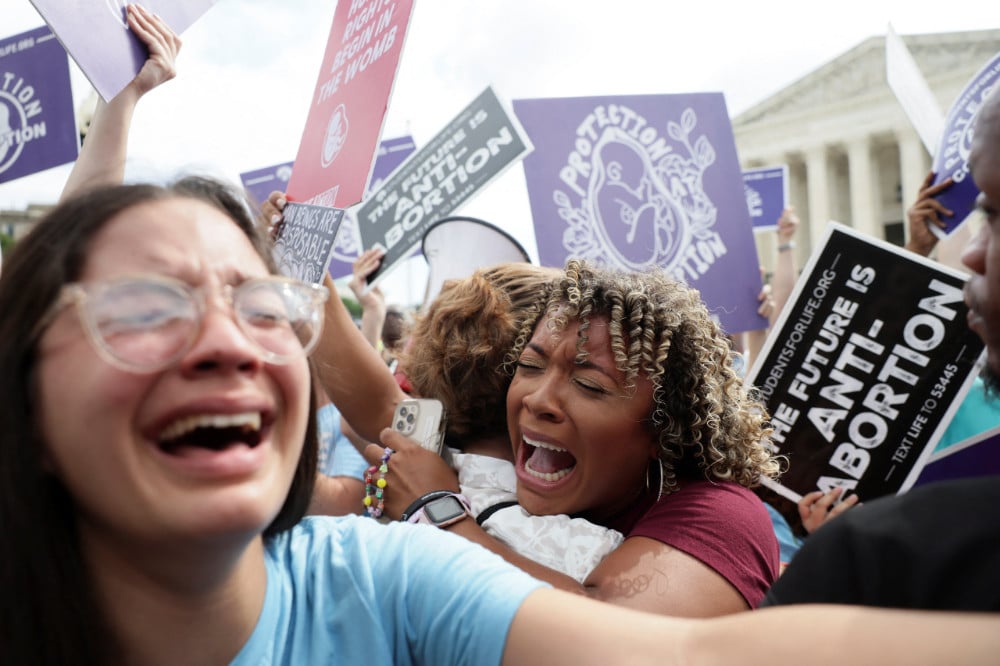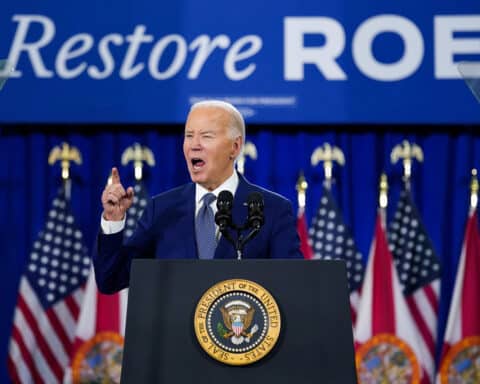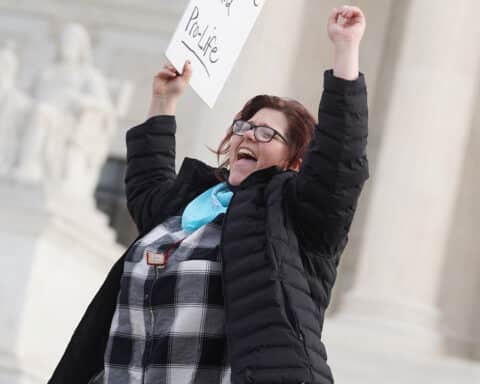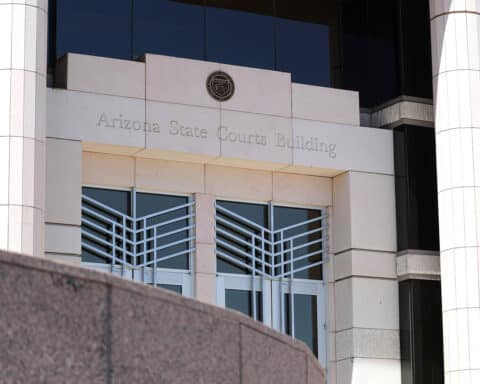While the Supreme Court delivered a stunning victory for human life in rejecting the idea that the Constitution guarantees a right to abortion, the real work only begins now. The pro-life movement faces the dual challenge of winning the enactment of pro-life laws and replacing the culture of death with a culture of life.
Before the ruling, pro-lifers hoped the Supreme Court would reverse Roe v. Wade, the 1973 ruling that legalized abortion, and Planned Parenthood v. Casey, the 1992 case upholding Roe, and the court delivered the goods in its Friday decision by a vote of 6-3.
Writing for the majority in a Mississippi case called Dobbs v. Jackson Women’s Health Organization, Justice Samuel Alito said the Roe decision was flagrantly wrong from the start. “We hold that Roe and Casey must be overturned,” he declared. “The Constitution makes no reference to abortion, and no such right is implicitly protected by any constitutional provision, including the one on which the defenders of Roe and Casey now chiefly rely” — the Due Process clause of the 14th Amendment.
Justices Clarence Thomas, Neil Gorsuch, Brett Kavanaugh and Amy Coney Barrett joined in Alito’s opinion. Chief Justice John Roberts concurred in the judgment while saying he thought the decision went farther than necessary by not only upholding Mississippi’s ban on most abortions after the 15th week of pregnancy but overturning Roe and Casey. Dissenting, as expected, were the court’s three liberals — Justices Stephen Breyer, Sonia Sotomayor and Elena Kagan.
Anticipating a pro-life decision before the court spoke, President Joe Biden said he would protect access to abortion through unspecified executive orders. Biden does not have the authority to reverse the new ruling, but he could do something short of that such as providing government funds to cover the expenses of women traveling to an abortion-friendly state or blocking efforts to bar abortion drugs from being mailed.
For the immediate future, though, what matters most is what happens in the states. Thirteen of them have “trigger” laws restricting abortion that automatically become operative in the wake of the Supreme Court ruling, and others have either already enacted new laws or will do that now. But the other side of that particular coin is that abortion-friendly states, including California and New York, are expected to act to expand abortion access.
In the short run, Congress can be counted on to produce a flood of angry pro-choice rhetoric but not much otherwise. Pro-abortion members will urge “packing” the Supreme Court by adding justices to create a new pro-choice majority, but that idea has little or no chance of passing. Instead, abortion will be a big issue in the November congressional elections, and there is no way to predict what the new Congress will do until the election returns are in.
While pro-abortion media are predictably focusing their attention on efforts to undo what the Supreme Court did, pro-life advocates have begun to urge federal legislation extending new positive protection to the unborn. So, for example, in an essay in The Washington Post, pro-life scholars Robert George of Princeton and Josh Craddock of the James Wilson Institute argued that, as some states adopt laws allowing abortion “to the very point of birth,” Congress should act to enforce the 14th Amendment’s guarantee of equal protection of the law on behalf of unborn children.
But the challenge to the pro-life movement is heightened by the degree to which abortion has spread in the nearly half-century since Roe v. Wade. During that time, some 65 million surgical and medical abortions have been performed in the United State, with the number in 2020, the latest year for which a number is available, at 930,160. These figures do not include the great number of very early abortions via abortifacient drugs.
According to the Pew Research Center, 38% of the women who had abortions in 2019 were non-Hispanic Black, 33% were non-Hispanic white, 21% were Hispanic, and 7% were of other races or ethnicities. For 24% of the women, it was their second abortion, for 11% their third, and for 8% their fourth or higher. Abortion has also become an important part of the ideology of “reproductive freedom” promoted by secular feminism and mainstream secular media.
Beyond seeking new laws to protect the unborn and provide support to pregnant women, therefore, pro-lifers need to redouble their efforts to educate and motivate and — perhaps the biggest challenge of all — convert a secular culture wedded to the idea of abortion as an adjunct to sexual liberation.
Meanwhile, the Supreme Court decision finds pro-lifers bracing for a continuation of the attacks on pregnancy centers and Catholic churches that followed the leak on May of a draft version of the opinion by Justice Alito. A coalition of pro-life and religious leaders released a letter June 16 protesting the Biden administration’s “relative silence” on the matter and calling on the Justice Department for “vigorous efforts” to prevent the violence and prosecute those responsible.
In his majority opinion, Justice Alito acknowledged that the court’s action was likely to be controversial.
“We do not pretend to know how our political system or society will respond to today’s decision overruling Roe and Casey,” he wrote.
“And even if we could foresee what will happen, we would have no authority to let that knowledge influence our decision. We can only do our job, which is to interpret the law, apply longstanding principles of stare decisis [the legal doctrine that earlier decisions should usually, though not always, be allowed to stand], and decide this case accordingly.
“We therefore hold that the Constitution does not confer a right to abortion. Roe and Casey must be overruled, and the authority to regulate abortion must be returned to the people and their elected representatives.”
Shortly after the court’s decision was announced, Archbishop José H. Gomez of Los Angeles, president of the U.S. Conference of Catholic Bishops and Archbishop William E. Lori of Baltimore, chairman of the USCCB’s Committee on Pro-Life Activities, issued a joint statement in which they called it a “historic day in the life of our country, one that stirs our thoughts, emotions and prayers.” They continued: “America was founded on the truth that all men and women are created equal, with God-given rights to life, liberty, and the pursuit of happiness. This truth was grievously denied by the U.S. Supreme Court’s Roe v. Wade ruling, which legalized and normalized the taking of innocent human life. We thank God today that the court has now overturned this decision. We pray that our elected officials will now enact laws and policies that promote and protect the most vulnerable among us. …
“Now is the time to begin the work of building a post-Roe America. It is a time for healing wounds and repairing social divisions; it is a time for reasoned reflection and civil dialogue, and for coming together to build a society and economy that supports marriages and families, and where every woman has the support and resources she needs to bring her child into this world in love.”
Russell Shaw is a contributing editor for Our Sunday Visitor.





